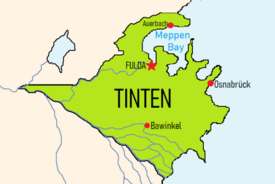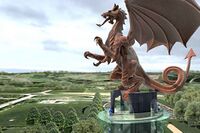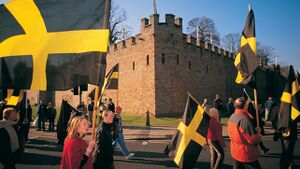Tinten: Difference between revisions
mNo edit summary |
No edit summary |
||
| Line 225: | Line 225: | ||
==Foreign Relations and Military== | ==Foreign Relations and Military== | ||
Tinten has a network of 64 diplomatic missions abroad and maintains relations with more than 40 countries. Tinten has a strict anti-terrorism policy and will always offer aid against terrorists, even with non-allies. Tinten partners with [[Cadair]] in counter-terrorism attempts and is known to make preemptive strikes against terrorists threats. | |||
===Controversies=== | |||
=== | In 1993 President Bernd Muller attempted to surrender the sovereignty of Tinten and merge with Drambenburg. The House of Parliament sided with the President, but nearly 89% of the people were against the merger with many riots and mergers following. | ||
==Economy== | ==Economy== | ||
Revision as of 20:41, 24 January 2020
The Republic of Tinten | |
|---|---|
|
Flag | |
| Motto: "Nun Tinten, Immer" | |
| Anthem: Wie Flüsse fließen | |
 | |
| Capital | Fulda |
| Official languages | German |
| Recognised national languages | German, English |
| Demonym(s) | Zelte |
| Government | Democracy |
• Präsidentin | Isaak Ritterbach |
| Population | |
• 2016 census | 47,000,000 |
| HDI (2016) | 0.78 high |
| Currency | Col (COL) |
| Date format | dd-mm-yyyy |
| Driving side | left |
| Calling code | +93 |
| Internet TLD | .tt |
Tinten, is a constitutional democracy in the International Democratic Union. Located on the south-east side of the continent of, and neighbored by Drambenburg to the west and the Olympic Ocean to the east. Officially founded in 1801 after a coup overthrew the Kingdom of Tintenburg. Known for being an agricultural and manufacturing power house with a loud and colorful culture.
Geography
Tinten lies on the eastern coast of the continent of and is bordered to the west by Dramdenburg and to the east by the Olympic Ocean.
Climate
Most of Tinten has a temperate seasonal climate dominated by humid westerly winds. The climate is moderated by the South Olympic Drift, the northern extension of the Gulf Stream. This warmer water affects the areas bordering the South Olympic Ocean; consequently in the northwest and the north the climate is oceanic. Germany gets an average of 789 mm (31 in) of precipitation per year; there is no consistent dry season. Winters are cool and summers tend to be warm: temperatures can exceed 30 °C (86 °F).[101]
The west has a more continental climate: winters can be very cold and summers very warm, and longer rain periods can occur. Central and southern Tinten are transition regions which vary from moderately oceanic to continental. In addition to the maritime and continental climates are predominant in most of the country, the alpine regions in the extreme south and, to a lesser degree, some areas of the Northern Tinten Uplands have a mountain climate, with lower temperatures and more precipitation
Biodiversity
The territory of Tinten can be divided into two ecoregions: Southern mixed forests and Northeast shelf marine. As of 2010 the majority of Germany is covered by either arable land (34%) or forest and woodland (30.1%), while 13.4% consists of permanent pastures, and 11.8% is covered by settlements and streets.
Plants and animals include those generally common to Southern. Beeches, oaks, and other deciduous trees constitute one-third of the forests; conifers are increasing as a result of reforestation. Spruce and fir trees predominate in the upper mountains, while pine and larch are found in sandy soil. There are many species of ferns, flowers, fungi, and mosses. Wild animals include roe deer, wild boar, fox, badger and hare.
The Fulda National Zoo opened in 1948, and is partnered with over 600 other zoo's globally.
Demographics
The 2018 census of Cadair showed a population of 35,000,000, an increase of over 1,000,000 since the invitation of return for the Sileiro in 2015. This is set to increase with the legalization of immigration in 2020. The population density is 174 per square kilometer. Life expectancy is 82.34 and fertility rate is 2.4 per woman.
With the current ban on immigration, there is very little cultural differences in Cadair. Only the ethnic Cymry, Prydainians and the Sileiro inhabit the islands. There are a few illegal immigrants of various ethnicities that come through for tourism and attempt to stay in Cadair. An estimated 21 illegal immigrants are deported every year.
Religion
Due to the separation of Church and State dictated in Hawl I Rym, the Kingdom of Cadair has no official religion.
The largest religion in Wales is Cadwaladr, with 53.2 per cent of the population describing themselves as Cadwdr in the 2011 census. The
Addoliad Shrine, located outside Tenby sees over 1 million visitors every year.

Christianity was introduced in the eighth century with the arrival of the Prydanians, and was the official religion of the Prydainian Empire. Most Prydanians and some Cymry are Christian, totaling 31.7% of the population. Atheism and various ethnic cults also exist, but most foreign religions have no presence in Cadair.
The most significant cult is Hanghenfil, a group who worship a sleeping alien hidden under the seas. Followers of Hanghenfil believe that when Hanghenfil awakens, it will purify the world.
Culture
Cadair has developed a distinctive culture, nearly untouched by other civilizations. Since their independence from Prydania in 1983, the Cymry people tried to destroy any influence Prydanian culture had on them and return to their ancient traditions. Due to their shared history of enslavement and genocide, many aspects of Cymry and Gaeil culture have melded together.
Mythology
Entertainment Industry
Sports
The Cymry people hold a great love of sport, and many citizens are members of a sports club where they play for leisure and watch professional play.

The most popular sport is association futball (soccer), with 20 teams, divided into two leagues, the Cymry Premier League and the Cymry Second League, with the Cymru Futball Association participating in international friendlies and competitions.
The Cymry Boxing Association also has a large following in Cadair, with 13,000,000 annual attendees each year. The matches are split between two regions, the Eastern Division in Cardiff, and the Western Division in Aberystwyth, with the national finals alternating between the two capitols. Other sports have gained popularity in recent years, with many clubs adopting basketball and rugby, though either have yet to establish a professional presence in Cadair.
Music
Cadair has recently become known for its harpists, choirs, and solo artists. Cymry festivals are often accompanied with music and dancing, as well as the National Eisteddfod, a festival dedicated to Cymry music. Traditional music and dance in Cadair is supported by a myriad of societies. The Traditional Cymry Song Society has published a number of collections of songs and tunes.
The traditional instruments of Cadair are the Crwth and the harp, though, drums and the zither were adopted after the arrival of the Prydainian Tribes in 453 AD.
The Prydanian Empire founded the Imperial Orchestra in 1921 in an attempt to promote patriotism. Private orchestras and bands began to form in the mid 1950's as more people sought to be involved in music. Some of these orchestras and bands, such as TEAL, have become known internationally.
Festivals
Cadairians are known internationally for their love of festivals and holidays. There are three national festivals: Dydd Gwyl Dewi (St. David's Day), where participants wear daffodils, participate in parades and feast in the evening; Mari Lwyd (New Year's Day), filled with parades, dancing, drinking and fireworks; The biggest national festival is Day of Liberty , the anniversary of Cymry independence, marked with Cymry flags, the burning of the Prydainian flag and fireworks.

Cities
(See article: Cadair)
|
Largest Census Metropolitan areas in Cadair by population | |||||
| No. | CMA City |
Population | |||
| 1 | Aberystwyth | 12,092,000 | |||
| 2 | Cardiff | 11,237,000 | |||
| 3 | Port Talbot | 6,120,000 | |||
| 4 | Chepstow | 5,020,000 | |||
| 5 | Machynlleth | 5,005,000 | |||
| 6 | Bridgend | 1,943,000 | |||
| 7 | Tenby | 1,921,000 | |||
| 8 | Monmouth | 860,000 | |||
| 9 | Pontypridd | 753,000 | |||
| 10 | Fishguard | 694,000 | |||
| 11 | Carmarthen | 507,000 | |||
| 12 | Ruthin | 341,000 | |||
Government
Cadair is a Constitutional Monarchy, with the monarch, called Mab Darogan, wielding absolute power over the government. Most legal issues are localized under Mayors, who are elected by the people. The people are protected by the constitution, called Hawl I Rym. Hawl I Rym protects the rights of the people and gives them the right to impeach the mayors and to appeal to Mab Darogan in any legal matter.
National News
The Cadair Chronicle is the most popular Cymry news source, both domestically and internationally. It broadcasts through print, television, radio and the internet from its headquarters in Cardiff
The Cymry Free Press is also an extremely popular news source in Cadair, covering both hard and soft news. Many popular magazines, such as Sports Pictures and Popular Economics are owned by the Cymry Free Press.
Foreign Relations and Military
Tinten has a network of 64 diplomatic missions abroad and maintains relations with more than 40 countries. Tinten has a strict anti-terrorism policy and will always offer aid against terrorists, even with non-allies. Tinten partners with Cadair in counter-terrorism attempts and is known to make preemptive strikes against terrorists threats.
Controversies
In 1993 President Bernd Muller attempted to surrender the sovereignty of Tinten and merge with Drambenburg. The House of Parliament sided with the President, but nearly 89% of the people were against the merger with many riots and mergers following.
Economy
Cadair is a free capitalist economy, putting few restrictions on companies. Cadair focuses on tourism, manufacturing, and mining. Cadair's exports account for 39% of its national output.
Tourism
Tourism is Cadair's leading industry as the islands rich history, beautiful climate and warm oceans bring millions of visitors every year. The opening seasons of the national sports leagues in 2018 caused a tremendous increase in domestic tourism as well.
Manufacturing
Cadair's manufacturers are predominantly focused on energy equipment, cars, trains, and engines. Cadair is one of the largest manufacturers of coal power equipment in the IDU, and the only manufacturer of Marine energy equipment. Cadair is also home to Ceffyl Automobiles, a large automobile manufacturer gaining ground overseas.
Mining
Many of the mountains of Cadair are laden with volcanic metals, such as Aluminum and nickel. Iron and coal are also plentiful. While some of these metals are exported, most remain in the country for manufacturing uses.
Electricity
While much of Cadair's electricity is coal based, the nation has been pushing towards green energy. As of January, 2019, Wind energy provides 17% of the nations power and marine energy provides 36%.